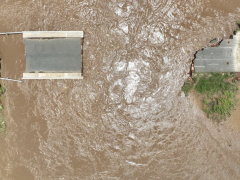Collaboration between South Africa and Australia's agricultural sectors could yield significant positive benefits for both countries, in the view of agricultural economist Wandile Sihlobo.
Following meetings with the meat and livestock industry, grain growers, academic researchers and Horticulture Innovation Australia during a visit to the country, Sihlobo said it was clear that most stakeholders were aware of South Africa's farming advancements and its contribution to the global food, fibre and beverages trade.
“The same is true in South Africa; we look at Australia with a great appreciation of their contribution to global meat and livestock, wine, wheat, horticulture and other products,” he said.
And while it may be easy to view the countries as competitors, particularly since both produce in the same season, and can look at roughly the same export markets for some products, he argues that there is much room for collaboration and mutual benefits.
“If one considers the wheat industry, for example, South Africa is working on boosting its production, but over the foreseeable future, it will likely remain a net importer. Our imports are generally around 1.8 million tonnes a year. Australia is one of the key high-quality wheat producers that could continue to supply the South African market.
“Similarly with rice. We don't produce any, and Australia could, over time, join the likes of India and Thailand in experiencing the million tonnes of annual rice imports in South Africa.”
And this does not need to be one-way and should not primarily focus on trade, says Sihlobo.
“The most promising area for collaboration between the two countries could be in research-related matters. We can lean on some of their work, particularly because of the similarities in our environments. The work Australia is doing on plant health and seed breeding in various commodities is particularly key to our agricultural efforts in South Africa.
“In the livestock industry, Australia has advanced in biosecurity and surveillance, another area of potential collaboration. Admittedly, the fact that the country is an island provides it with a buffer from the various diseases in a way that South Africa is unable to be shielded. Still, the rigorous biosecurity practices are something that we can learn from and implement in our work at home.”
On the academic level, there are already various collaborations between some Australian universities and South African ones on agricultural matters, particularly on poultry and nutrition research.
“This knowledge sharing and partnership are key to strengthening our farming sectors and enhancing the relationship between the two countries,” he added.
“There is also a lot more we could learn about the agricultural research funding approach in Australia. Both the government and industry contribute financial resources to research, and industry has a notable say in what areas should be prioritised for the good of the sector's progress. This is one area we are yet to improve in South Africa.
“Of course, we have a structurally different agricultural sector, partly because of our various histories. In South Africa, consideration must be given to the inclusion and support of small-scale farmers.”













